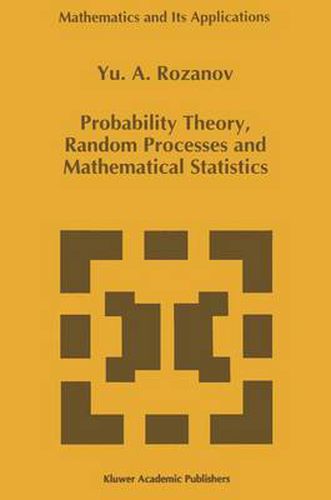Readings Newsletter
Become a Readings Member to make your shopping experience even easier.
Sign in or sign up for free!
You’re not far away from qualifying for FREE standard shipping within Australia
You’ve qualified for FREE standard shipping within Australia
The cart is loading…






This title is printed to order. This book may have been self-published. If so, we cannot guarantee the quality of the content. In the main most books will have gone through the editing process however some may not. We therefore suggest that you be aware of this before ordering this book. If in doubt check either the author or publisher’s details as we are unable to accept any returns unless they are faulty. Please contact us if you have any questions.
Probability Theory, Theory of Random Processes and Mathematical Statistics are important areas of modern mathematics and its applications. They develop rigorous models for a proper treatment for various ‘random’ phenomena which we encounter in the real world. They provide us with numerous tools for an analysis, prediction and, ultimately, control of random phenomena. Statistics itself helps with choice of a proper mathematical model (e.g., by estimation of unknown parameters) on the basis of statistical data collected by observations. This volume is intended to be a concise textbook for a graduate level course, with carefully selected topics representing the most important areas of modern Probability, Random Processes and Statistics. The first part (Ch. 1-3) can serve as a self-contained, elementary introduction to Probability, Random Processes and Statistics. It contains a number of relatively sim ple and typical examples of random phenomena which allow a natural introduction of general structures and methods. Only knowledge of elements of real/complex analysis, linear algebra and ordinary differential equations is required here. The second part (Ch. 4-6) provides a foundation of Stochastic Analysis, gives information on basic models of random processes and tools to study them. Here a familiarity with elements of functional analysis is necessary. Our intention to make this course fast-moving made it necessary to present important material in a form of examples.
$9.00 standard shipping within Australia
FREE standard shipping within Australia for orders over $100.00
Express & International shipping calculated at checkout
This title is printed to order. This book may have been self-published. If so, we cannot guarantee the quality of the content. In the main most books will have gone through the editing process however some may not. We therefore suggest that you be aware of this before ordering this book. If in doubt check either the author or publisher’s details as we are unable to accept any returns unless they are faulty. Please contact us if you have any questions.
Probability Theory, Theory of Random Processes and Mathematical Statistics are important areas of modern mathematics and its applications. They develop rigorous models for a proper treatment for various ‘random’ phenomena which we encounter in the real world. They provide us with numerous tools for an analysis, prediction and, ultimately, control of random phenomena. Statistics itself helps with choice of a proper mathematical model (e.g., by estimation of unknown parameters) on the basis of statistical data collected by observations. This volume is intended to be a concise textbook for a graduate level course, with carefully selected topics representing the most important areas of modern Probability, Random Processes and Statistics. The first part (Ch. 1-3) can serve as a self-contained, elementary introduction to Probability, Random Processes and Statistics. It contains a number of relatively sim ple and typical examples of random phenomena which allow a natural introduction of general structures and methods. Only knowledge of elements of real/complex analysis, linear algebra and ordinary differential equations is required here. The second part (Ch. 4-6) provides a foundation of Stochastic Analysis, gives information on basic models of random processes and tools to study them. Here a familiarity with elements of functional analysis is necessary. Our intention to make this course fast-moving made it necessary to present important material in a form of examples.